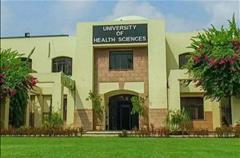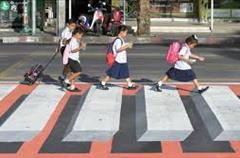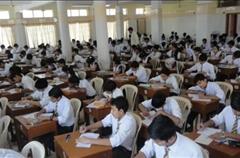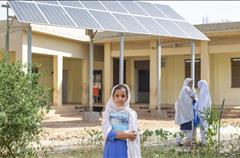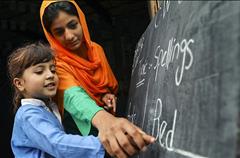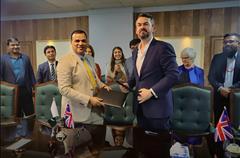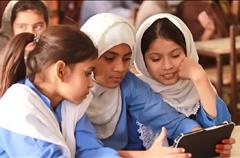LAHORE: (September 2015) (Press Release) Punjab University Vice Chancellor Prof Dr Mujahid Kamran has said that after reading book of Spanish Assistant Professor at PU Dr Maria Maldonado titled “Urdu Evolution and Reforms”, it is learnt that Urdu language is 2000 years old which is an interesting and astonishing finding. He was addressing the book launching ceremony of Director External Linkages and Incharge Institute of Languages Dr Maria Maldonado at Al Raazi Hall here on Wednesday. Dean School of Education Beaconhouse National University Prof Dr Tariq Rehman, Incharge Institute of Communication Studies Dr Noshina Saleem, Secretary Academic Staff Association Dr Mahboob Hussain, senior faculty members and a large number of students were present on the occasion.
Addressing the ceremony, Dr Mujahid Kamran said that it was a common impression that Urdu language was spoken in Mughal era but the book had traced that it was spoken before Mughal era. He said that there were evidences that Urdu language was spoken in 13th century and it was yet to find some specific evidences to prove Urdu language’s existence before 13th century. He congratulated Dr Maria Maldonado for doing research on evolution of Urdu and identifying reforms in the language. Addressing the ceremony, Dr Tariq Rehman said that it was a unique idea to do research on evolution of Urdu. He said that Urdu had local roots and it was not a “spaghetti language”.
He said that the book had addressed the evolution of word “Urdu” as Urdu had different names in different eras and had removed many misconceptions about the language. He said that the British also promoted Urdu language for many reasons and it was separated from Hindi language on political basis. He said that the book had covered various topics including reforms of the Urdu language, shared vocabulary in Urdu and Turkish languages, Sanskrit and Prakrit elements in Urdu, English elements in Urdu and etymological elements in the vocabulary of Urdu. In her address, Dr Maria Maldonado emphasized that there must be scientific study of languages. She said that it was a topic in which no one has engaged before. She said that Urdu derived from Sanskrit, an almost extinct language, which developed into the Prakrtis and later on into the languages today known as Urdu and Hindi.
Elements of Persian, Arabic and some say Turkish were incorporated into Urdu at a later stage through different language reforms, Islamic and cultural influences. She said at the same time, Hindi eliminated elements from Persian, and Arabic and kept on borrowing lexical elements from Sanskrit. She said with the arrival of Islam to the Subcontinent, the predecessor language of Urdu and Hindi was split into these two languages according to the religion of the speakers. She said that the Muslims utilized a Persian script called Nastaliq and the Hindus kept de Devanagari script. She said that the split of the language according to the script gave birth, in fact, to two different languages, Hindi and Urdu.
She said that many scholars, authors, journalists and even linguists have believed throughout the years that Urdu is a mixture of Arabic, Persian and Turkish languages. She said that this assumption is erroneous. She said that languages received influences from other languages they come in contact with. She said in this particular case, Urdu has received loan words and various grammar structures from Arabic and especially Persian. She said this was not to say that Urdu was a mixture of all of them, it is virtually impossible to create a new language by mixing elements from others. It simply doesn’t work effectively. She thanked PU VC Dr Mujahid Kamran for his support for publication of her book.


















